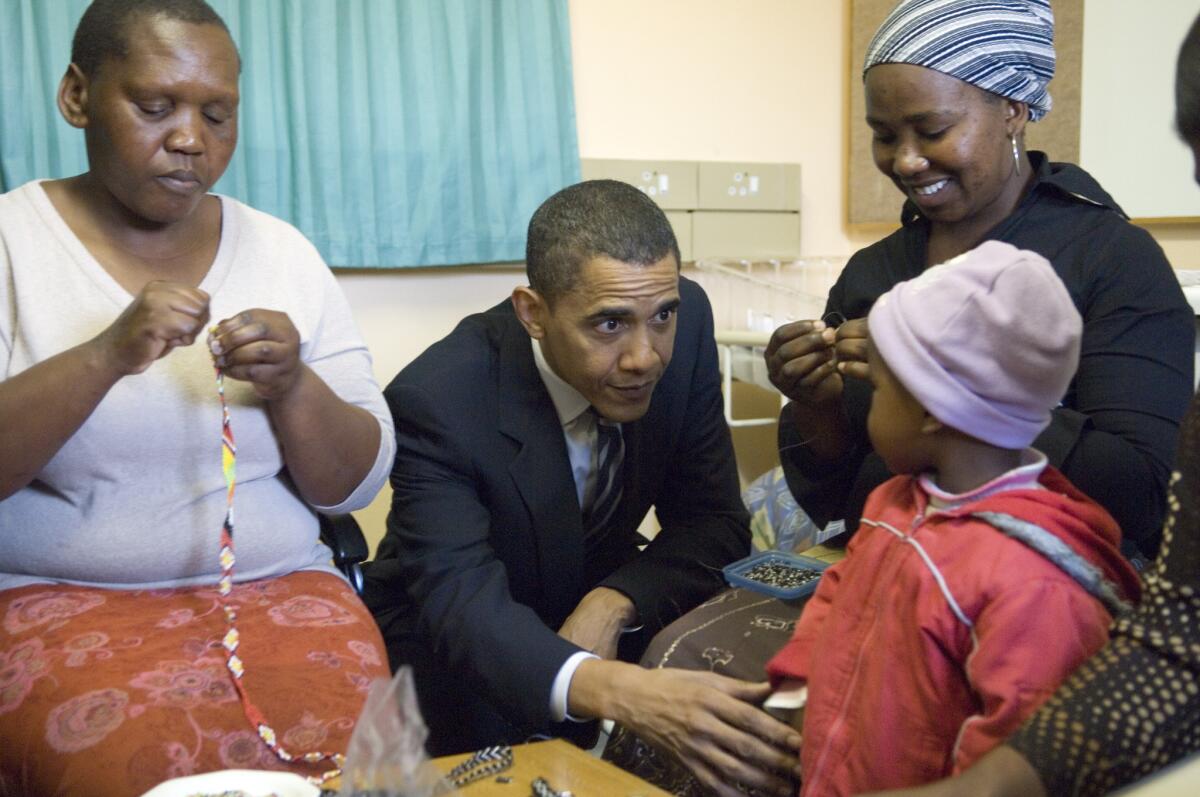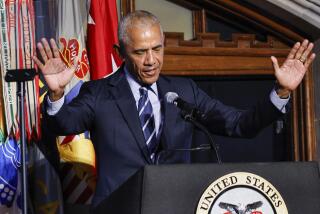From the archives:: Sen. Barack Obama’s Kenya visit inspires Obama-Mania

Sen. Barack Obama visits Khayelitsha, a poor township outside Cape Town, where he criticized the federal government’s response to HIV/AIDS. He has donated $14,000 to an AIDS orphan facility in Kenya, where his African tour heads this week.
- Share via
Reporting from NYANGOMA-KOGELO, Kenya — For years farmers here complained about the broken dirt road through their village, so bumpy that taxi and bus drivers refused to take it. Then, two weeks ago, the government suddenly sent a tractor to smooth the way, conspicuously stopping at the doorstep of one family.
“They’re not fooling anyone,” said Said Hussein Obama, whose home lies at the end of the newly improved road. “It’s only because he’s coming. You watch, next week we’ll have electricity!”
You can’t fault Kenyan officials for wanting to spruce up a little before the eagerly anticipated visit late this week of Sen. Barack Obama of Illinois, a rising star in the Democratic Party whose late father hailed from this tiny farming town.
Obama-mania is sweeping the nation, particularly the long-marginalized west, which is preparing a hero’s homecoming for the half-Kansan, half-Kenyan senator, who began a 15-day, five-nation African tour over the weekend.
Construction workers are racing to complete the new science lab at the recently rededicated Senator Obama Secondary School. A play based on his best-selling autobiography recently took the stage at Kenya’s National Theater. Sales of long-popular Senator beer, which locals dubbed “Obama” after his election, have doubled since June, brewery officials said.
Obama’s parents met and married in Hawaii, where he was born. When he was a toddler, his parents separated, and he only saw his father once afterward. The senator hasn’t visited Kenya in 14 years. His support for abortion and gay rights would roil most voters here. But none of that matters to locals, who see Obama, 45, as their new favorite son.
“He’s a role model for all of Africa,” said Kenyan playwright George Orido, who adapted Obama’s “Dreams From My Father” for the stage. When the publisher refused to authorize the production, Orido proceeded anyway.
“His story is our story now,” the writer explained. “It’s moved beyond him. He proves that Africans have the brains to lead. They don’t always have to be dictators or despots.”
High expectations are symptomatic of the underdevelopment plaguing so much of Africa. This part of western Kenya remains one of the most impoverished regions in the country. Obama’s family homestead, near the western city of Kisumu, has never received water, paved roads or electricity.
Obama is also facing strong cultural and tribal traditions that demand family and clan members, even distant ones or those returning after a long absence, should share their success with the less fortunate. Villagers and family members here see Obama as a rich, powerful American, speaking about him with pride and admiration, but also a hint of disappointment that he hasn’t done more to help them.
“It’s tradition that when your man is on top, he is supposed to help,” said Said Obama, the senator’s uncle, a laid-off brewery mechanic.
Barack Obama visited Kenya twice, in 1987 and 1992, first while he was in school and then while he was working as a community organizer in Chicago. His political career soared after a rousing speech during the 2004 Democratic National Convention, which began speculation that he’d one day run for president.
In an interview before he departed, the senator said he hoped his trip would shine a spotlight on Africa’s struggles, from the bloodshed in Sudan’s Darfur region to the promise of recent elections in the Democratic Republic of Congo. On Monday, he toured an AIDS treatment facility in Cape Town, where he criticized the South African government’s response to the disease.
In Kenya, Obama said, he planned to use his personal connection to the country to challenge leaders about good governance and fighting corruption, with an emphasis on African self-reliance.
“I may be able to talk to Africans in a way that other American politicians are not able to talk, and to challenge them,” he said. “Aid packages alone don’t deliver the goods for people on the ground. The key to Kenya’s success is going to come from folks on the inside, not the outside.”
But back at his family homestead, people are asking not what they can do for Africa, but what Obama can do for them.
There’s no shortage of ideas. A new tarmac road would be nice, one resident said. Others spoke of the shoddy health dispensary, which lacks bandages and drugs. A councilman wondered whether Obama could divert World Bank funds to the village. A student suggested an educational exchange program, similar to the one that allowed Obama’s father to leave the village in the late 1950s.
At the high school named in the senator’s honor, the empty science laboratory is intended as a not-so-subtle hint.
“When he sees that it is empty, maybe he will fill it,” said a smiling Mairsat Onyango, the school secretary.
Some in the town scoffed at the hype associated with Obama’s visit. “It borders on hero worship,” said Francis Oketch, a land surveyor.
But inside the school, the story of Obama and his father serve as a lesson about the merits of hard work. “If he can do it, so can I,” said Stephen Momodi, 17, a freshman. “I just need to study more.”
Asked what he might say to the famous man when he visits, the teenager responded: “I’d ask him to pay for my school fees.”
Obama said high expectations were not surprising given the stark economic differences between Kenya and the United States.
“I’m going to try to tamp them down when I’m there,” he said. “But my suspicion is that there are going to be some disappointments if people think I’m coming with a suitcase full of help.”
He has made a personal $14,000 donation to an AIDS orphan care facility in Kenya, but he said he did not plan to announce any additional contributions during the trip.
With about 50 acres of farmland, Obama’s family here shares a collection of small tin-roofed shacks with cement floors, making them better off than neighbors who live in straw-roofed mud huts. A new water pump means the Obamas don’t have to rely on daily deliveries from a donkey cart, but they still can’t afford a generator.
Obama’s grandmother, Sarah Ogwel Onyango, 85, grows and sells vegetables at the local market. “Working keeps me strong,” she said.
“We will be so happy to see him,” Onyango said, adding that she was particularly looking forward to spending time with Obama’s two young daughters. The last time she spoke with the senator was at his 2005 inauguration. “I got to meet President Bush,” she said.
Since then, the family has seen a regular stream of distant relatives, journalists and strangers, many seeking money, food or help in obtaining U.S. visas.
“People assume that we’re better off financially now, even though we still have nothing,” Said Obama said.
Relatives say Obama has played host to visits to the U.S. by a handful of family members since his election, but hasn’t sent back money, as other relatives do. Onyango, who said she dreams of owning a small rental property to support her in retirement, predicted that would change once he visits.
“Barack is mature and observant,” she said. “He will see for himself what is lacking here, and then, if he can, he will help.”
More to Read
Sign up for Essential California
The most important California stories and recommendations in your inbox every morning.
You may occasionally receive promotional content from the Los Angeles Times.










